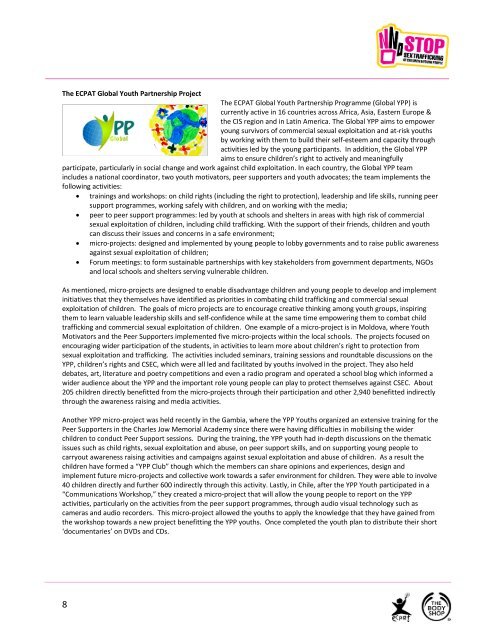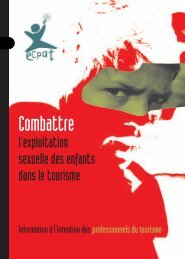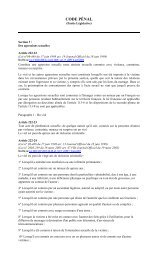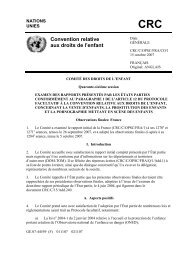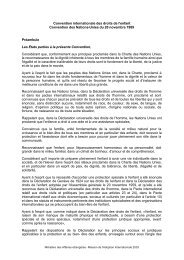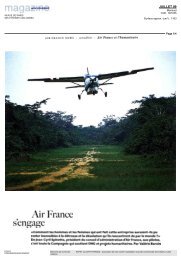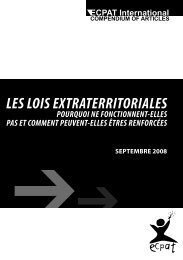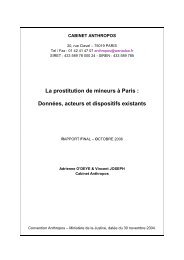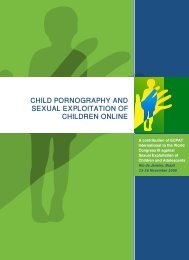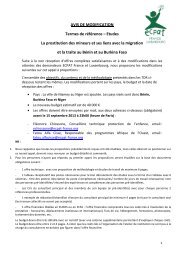[ecpat & the body shop 'stop sex trafficking of children ... - Ecpat France
[ecpat & the body shop 'stop sex trafficking of children ... - Ecpat France
[ecpat & the body shop 'stop sex trafficking of children ... - Ecpat France
Create successful ePaper yourself
Turn your PDF publications into a flip-book with our unique Google optimized e-Paper software.
The ECPAT Global Youth Partnership Project<br />
The ECPAT Global Youth Partnership Programme (Global YPP) is<br />
currently active in 16 countries across Africa, Asia, Eastern Europe &<br />
<strong>the</strong> CIS region and in Latin America. The Global YPP aims to empower<br />
young survivors <strong>of</strong> commercial <strong>sex</strong>ual exploitation and at‐risk youths<br />
by working with <strong>the</strong>m to build <strong>the</strong>ir self‐esteem and capacity through<br />
activities led by <strong>the</strong> young participants. In addition, <strong>the</strong> Global YPP<br />
aims to ensure <strong>children</strong>’s right to actively and meaningfully<br />
participate, particularly in social change and work against child exploitation. In each country, <strong>the</strong> Global YPP team<br />
includes a national coordinator, two youth motivators, peer supporters and youth advocates; <strong>the</strong> team implements <strong>the</strong><br />
following activities:<br />
• trainings and work<strong>shop</strong>s: on child rights (including <strong>the</strong> right to protection), leadership and life skills, running peer<br />
support programmes, working safely with <strong>children</strong>, and on working with <strong>the</strong> media;<br />
• peer to peer support programmes: led by youth at schools and shelters in areas with high risk <strong>of</strong> commercial<br />
<strong>sex</strong>ual exploitation <strong>of</strong> <strong>children</strong>, including child <strong>trafficking</strong>. With <strong>the</strong> support <strong>of</strong> <strong>the</strong>ir friends, <strong>children</strong> and youth<br />
can discuss <strong>the</strong>ir issues and concerns in a safe environment;<br />
• micro‐projects: designed and implemented by young people to lobby governments and to raise public awareness<br />
against <strong>sex</strong>ual exploitation <strong>of</strong> <strong>children</strong>;<br />
• Forum meetings: to form sustainable partnerships with key stakeholders from government departments, NGOs<br />
and local schools and shelters serving vulnerable <strong>children</strong>.<br />
As mentioned, micro‐projects are designed to enable disadvantage <strong>children</strong> and young people to develop and implement<br />
initiatives that <strong>the</strong>y <strong>the</strong>mselves have identified as priorities in combating child <strong>trafficking</strong> and commercial <strong>sex</strong>ual<br />
exploitation <strong>of</strong> <strong>children</strong>. The goals <strong>of</strong> micro projects are to encourage creative thinking among youth groups, inspiring<br />
<strong>the</strong>m to learn valuable leadership skills and self‐confidence while at <strong>the</strong> same time empowering <strong>the</strong>m to combat child<br />
<strong>trafficking</strong> and commercial <strong>sex</strong>ual exploitation <strong>of</strong> <strong>children</strong>. One example <strong>of</strong> a micro‐project is in Moldova, where Youth<br />
Motivators and <strong>the</strong> Peer Supporters implemented five micro‐projects within <strong>the</strong> local schools. The projects focused on<br />
encouraging wider participation <strong>of</strong> <strong>the</strong> students, in activities to learn more about <strong>children</strong>’s right to protection from<br />
<strong>sex</strong>ual exploitation and <strong>trafficking</strong>. The activities included seminars, training sessions and roundtable discussions on <strong>the</strong><br />
YPP, <strong>children</strong>’s rights and CSEC, which were all led and facilitated by youths involved in <strong>the</strong> project. They also held<br />
debates, art, literature and poetry competitions and even a radio program and operated a school blog which informed a<br />
wider audience about <strong>the</strong> YPP and <strong>the</strong> important role young people can play to protect <strong>the</strong>mselves against CSEC. About<br />
205 <strong>children</strong> directly benefitted from <strong>the</strong> micro‐projects through <strong>the</strong>ir participation and o<strong>the</strong>r 2,940 benefitted indirectly<br />
through <strong>the</strong> awareness raising and media activities.<br />
Ano<strong>the</strong>r YPP micro‐project was held recently in <strong>the</strong> Gambia, where <strong>the</strong> YPP Youths organized an extensive training for <strong>the</strong><br />
Peer Supporters in <strong>the</strong> Charles Jow Memorial Academy since <strong>the</strong>re were having difficulties in mobilising <strong>the</strong> wider<br />
<strong>children</strong> to conduct Peer Support sessions. During <strong>the</strong> training, <strong>the</strong> YPP youth had in‐depth discussions on <strong>the</strong> <strong>the</strong>matic<br />
issues such as child rights, <strong>sex</strong>ual exploitation and abuse, on peer support skills, and on supporting young people to<br />
carryout awareness raising activities and campaigns against <strong>sex</strong>ual exploitation and abuse <strong>of</strong> <strong>children</strong>. As a result <strong>the</strong><br />
<strong>children</strong> have formed a “YPP Club” though which <strong>the</strong> members can share opinions and experiences, design and<br />
implement future micro‐projects and collective work towards a safer environment for <strong>children</strong>. They were able to involve<br />
40 <strong>children</strong> directly and fur<strong>the</strong>r 600 indirectly through this activity. Lastly, in Chile, after <strong>the</strong> YPP Youth participated in a<br />
“Communications Work<strong>shop</strong>,” <strong>the</strong>y created a micro‐project that will allow <strong>the</strong> young people to report on <strong>the</strong> YPP<br />
activities, particularly on <strong>the</strong> activities from <strong>the</strong> peer support programmes, through audio visual technology such as<br />
cameras and audio recorders. This micro‐project allowed <strong>the</strong> youths to apply <strong>the</strong> knowledge that <strong>the</strong>y have gained from<br />
<strong>the</strong> work<strong>shop</strong> towards a new project benefitting <strong>the</strong> YPP youths. Once completed <strong>the</strong> youth plan to distribute <strong>the</strong>ir short<br />
‘documentaries’ on DVDs and CDs.<br />
8


